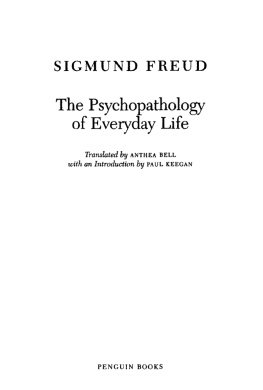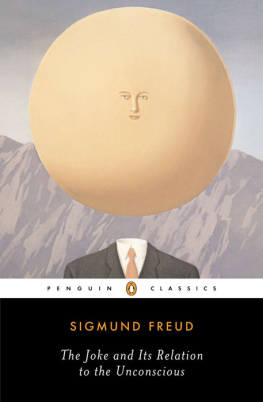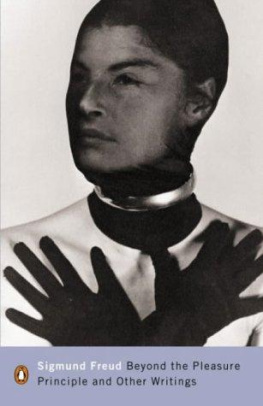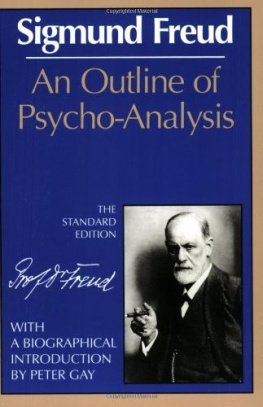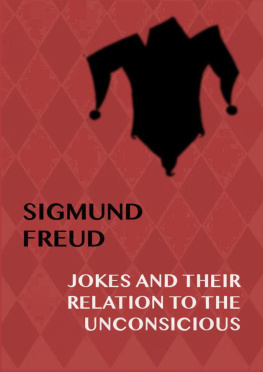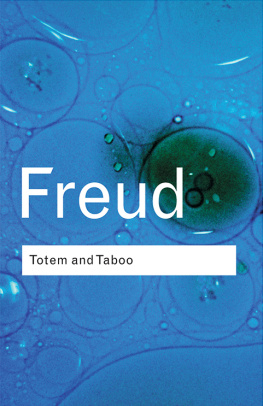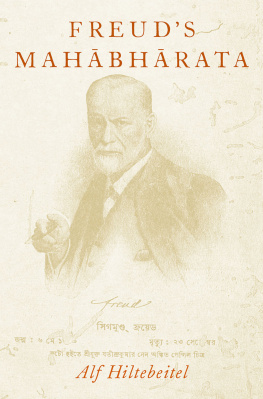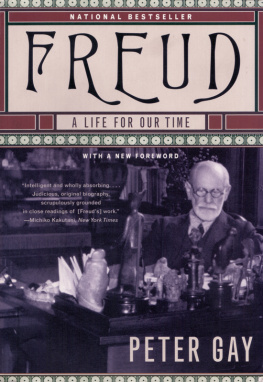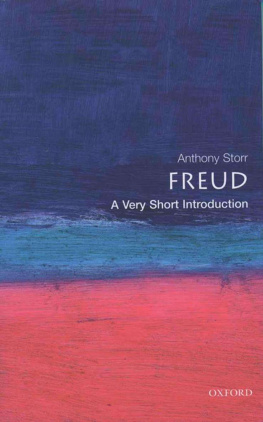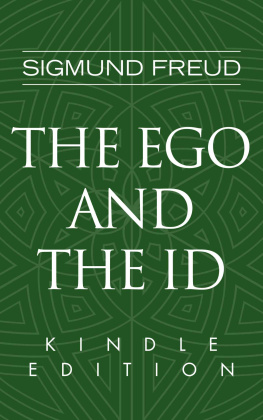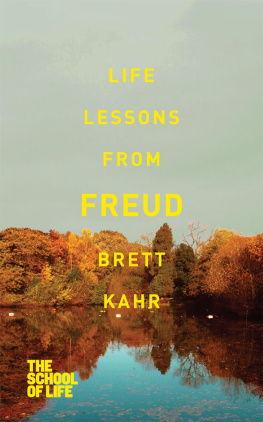Sigmund Freud - Freud - Complete Works
Here you can read online Sigmund Freud - Freud - Complete Works full text of the book (entire story) in english for free. Download pdf and epub, get meaning, cover and reviews about this ebook. year: 2011, publisher: Ivan Smith, genre: Science. Description of the work, (preface) as well as reviews are available. Best literature library LitArk.com created for fans of good reading and offers a wide selection of genres:
Romance novel
Science fiction
Adventure
Detective
Science
History
Home and family
Prose
Art
Politics
Computer
Non-fiction
Religion
Business
Children
Humor
Choose a favorite category and find really read worthwhile books. Enjoy immersion in the world of imagination, feel the emotions of the characters or learn something new for yourself, make an fascinating discovery.

- Book:Freud - Complete Works
- Author:
- Publisher:Ivan Smith
- Genre:
- Year:2011
- Rating:5 / 5
- Favourites:Add to favourites
- Your mark:
- 100
- 1
- 2
- 3
- 4
- 5
Freud - Complete Works: summary, description and annotation
We offer to read an annotation, description, summary or preface (depends on what the author of the book "Freud - Complete Works" wrote himself). If you haven't found the necessary information about the book — write in the comments, we will try to find it.
Freud - Complete Works — read online for free the complete book (whole text) full work
Below is the text of the book, divided by pages. System saving the place of the last page read, allows you to conveniently read the book "Freud - Complete Works" online for free, without having to search again every time where you left off. Put a bookmark, and you can go to the page where you finished reading at any time.
Font size:
Interval:
Bookmark:
Freud - Complete Works
Ivan Smith 2000, 2007, 2010, 2011. All rights reserved.
1584
PSYCHICAL (OR MENTAL) TREATMENT
(1890)
1585
Intentionally left blank
1586
PSYCHICAL (OR MENTAL) TREATMENT
Psyche is a Greek word which maybe translated mind. Thus psychicaltreatment means mental treatment. The termmight accordingly be supposed to signify treatment of thepathological phenomena of mental life. This, however, isnot its meaning. Psychical treatment denotes,rather, treatment taking its start in the mind, treatment (whetherof mental or physical disorders) by measures which operate in thefirst instance and immediately upon the human mind.
Foremost among such measures isthe use of words; and words are the essential tool of mentaltreatment. A layman will no doubt find it hard to understand howpathological disorders of the body and mind can be eliminated bymere words. He will feel that he is being asked tobelieve in magic. And he will not be so very wrong, for the wordswhich we use in our everyday speech are nothing other thanwatered-down magic. But we shall have to follow a roundabout pathin order to explain how science sets about restoring to words apart at least of their former magical power.
It is only comparativelyrecently, too, that physicians with a scientific training havelearnt to appreciate the value of mental treatment. And we caneasily see why this was so when we reflect on the evolution ofmedicine during the last half-century. After a somewhat unfruitfulperiod during which it was dependent on what was known asNatural Philosophy, it came under the happy influenceof the natural sciences and has achieved the greatest advancesalike as a science and as an art: it has shown that the organism isbuilt up from microscopically small elements (the cells), it haslearnt to understand the physics and chemistry of the various vitalprocesses (functions), it has distinguished the visible andobservable modifications which are brought about in the bodilyorgans by different morbid processes, and has discovered, on theother hand, the signs that reveal the operation of deep-lyingmorbid processes in the living body; moreover it has identified agreat number of the micro-organisms which cause illness and, withthe help of its newly acquired knowledge, it has reduced to a quiteextraordinary degree the dangers arising from severe surgicaloperations. All of these advances and discoveries were related tothe physical side of man, and it followed, as a result of anincorrect though easily understandable trend of thought, thatphysicians came to restrict their interest to the physical side ofthings and were glad to leave the mental field to be dealt with bythe philosophers whom they despised.
Psychical (Or Mental) Treatment
1587
Modern medicine, it is true, hadreason enough for studying the indisputable connection between thebody and the mind; but it never ceased to represent mental eventsas determined by physical ones and dependent on them. Thus stresswas laid on the fact that intellectual functioning was conditionalupon the presence of a normally developed and sufficientlynourished brain, that any disease of that organ led to disturbancesof intellectual functioning, that the introduction of toxicsubstances into the circulation could produce certain states ofmental illness, or - to descend to more trivial matters - thatdreams could be modified by stimuli brought to bear upon a sleeperfor experimental purposes.
The relation between body andmind (in animals no less than in human beings) is a reciprocal one;but in earlier times the other side of this relation, the effect ofthe mind upon the body, found little favour in the eyes ofphysicians. They seemed to be afraid of granting mental life anyindependence, for fear of that implying an abandonment of thescientific ground on which they stood.
This one-sided attitude ofmedicine towards the body has undergone a gradual change in thecourse of the last decade and a half, a change brought aboutdirectly by clinical experience. There are a large number ofpatients, suffering from affections of greater or less severity,whose disorders and complaints make great demands on the skill oftheir physicians, but in whom no visible or observable signs of apathological process can be discovered either during their life orafter their death, in spite of all the advances in the methods ofinvestigation made by scientific medicine. One group of thesepatients are distinguished by the copiousness and variety of theirsymptoms: they are incapable of intellectual work because ofheadaches or inability to concentrate their attention, their eyesache when they read, their legs become fatigued when they walk,develop dull pains or go to sleep, their digestion is disturbed bydistressing sensations, by eructations or gastric spasms, theycannot defaecate without aperients, they are subject tosleeplessness, and so on. They may suffer from all these disorderssimultaneously or in succession, or from only a selection of them;but in every case the illness is evidently the same. Moreover, itssigns are often variable and replace one another. A patient who hashitherto been incapacitated by headaches but has had a fairly gooddigestion may next day enjoy a clear head but may thenceforward beunable to manage most kinds of food. Again, his sufferings maysuddenly cease if there is a marked change in the circumstances ofhis existence. If he is travelling he may feel perfectly well andbe able to enjoy the most varied diet without any ill effects, butwhen he gets home he may once more have to restrict himself to sourmilk. In a few cases the disorder - whether it is a pain or aweakness resembling a paralysis - may suddenly pass from one sideof the body to the other: it may jump from his right side to thecorresponding part of the body on his left side. But in everyinstance it is to be observed that the symptoms are very clearlyinfluenced by excitement, emotion, worry, etc., and also that theycan disappear and give place to perfect health without leaving anytraces, even if they have persisted over a long period.
Medical research has at lastshown that people of this kind are not to be looked upon assuffering from a disease of the stomach or of the eyes or whateverit may be, but that it must be a question in their case of anillness of the nervous system as a whole. Examination of the brainand nerves of these patients has so far, however, revealed noperceptible changes; and, indeed, some of the features of theirsymptomatology prohibit any expectation that even more accuratemethods of investigation could ever discover changes of a sort thatwould throw light upon the illness. This condition has beendescribed as nervousness (neurasthenia or hysteria)and has been characterized as a merely functionaldisorder of the nervous system. Incidentally, an exhaustiveexamination of the brain (after the patients death) has beenequally without results in the case of many more permanent nervousdisorders, as well as in illnesses with exclusively mentalsymptoms, such as what are known as obsessions and delusionalinsanity.
See Volume II, Part X, Chapter 4 [of thework, Die Gesundheit, in which this paper of Freudsfirst appeared.]
Psychical (Or Mental) Treatment
1588
Physicians were thus faced by theproblem of investigating the nature and origin of the symptomsshown by these nervous or neurotic patients. In the course of thisinvestigation it was found that in some at least of these patientsthe signs of their illness originate from nothing other than achange in the action of their minds upon their bodies and thatthe immediate cause of their disorder is to be looked for in theirminds. What may be the remoter causes of the disturbance whichaffects their minds is another question, with which we need not nowconcern ourselves. But medical science was here provided with anopportunity for directing its full attention to what had previouslybeen the neglected side of the mutual relation between body andmind.
Font size:
Interval:
Bookmark:
Similar books «Freud - Complete Works»
Look at similar books to Freud - Complete Works. We have selected literature similar in name and meaning in the hope of providing readers with more options to find new, interesting, not yet read works.
Discussion, reviews of the book Freud - Complete Works and just readers' own opinions. Leave your comments, write what you think about the work, its meaning or the main characters. Specify what exactly you liked and what you didn't like, and why you think so.

